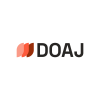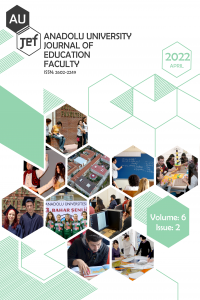Research Article
Review
Aim & Scope
Esteemed scientists,
Anadolu University Journal of Education (AUJEF) is a quarterly open-access peer-reviewed journal that is published electronically in the field of Educational Sciences and Teacher Training. The journal aims to contribute to the academic culture by sharing research, knowledge, and approaches in Educational Sciences and Teacher Training. Undoubtedly, the most significant contribution to this goal would come from esteemed researchers like yourself. The fact that the quality of academic studies is monitored as well as their quantity increases the value of scientific studies. For this purpose, the dedication and efforts of the reviewers of our journal are of great significance and importance for us. The devoted efforts and contributions would highly contribute to the journal's status on national and international platforms.
Anadolu University Journal of Education Faculty (AUJEF) is an international academic and scientific journal published four times in a year, namely January, April, July, and October. Besides, the journal has the right to publish additional issues in special circumstances. In the journal, all types of scientific studies (translation, critique, evaluation, examination, etc.) in the field of education will be welcomed. In this regard, studies that are prepared with a scientific approach related to educational sciences, teacher education, education, and instruction will be published in AUJEF. Besides, AUJEF is also interested in studies which are about:
- Qualitative studies
- Etnographic, historical, phenomenological, case studies, action research, etc.
- Quantitative studies
- Mixed methods research
- Articles introducing a viewpoint
- Perspectives on policies
- Critical literature reviews
- Book reviews
Author Guidelines
Ethical Principles and Publication Policy
Publication Ethics and Malpractice Statement
Anadolu University Journal of Education Faculty (AUJEF) is a quarterly academic journal published by the Faculty of Education, at Anadolu University located in Eskisehir, TURKEY. At AUJEF, we attach high importance to the integrity of our academic content, publication ethics and process as well as maintaining authors’ research integrity. We also do our best to follow the guidelines and resources provided by the Committee on Publication Ethics (COPE) to reach and maintain international publication standards.
This section outlines our basic principles that we apply to our journal, which we believe will be useful for researchers and authors who wish to publish their articles in our journal.
Editorial Board and Editorial Process
AUJEF works with experts from a wide range of areas in the context of educational sciences. These experts compose the body of our management board, advisory board and editorial board. These boards are also responsible for recommending, contacting, assigning reviewers, or approving the final version of the manuscripts before they are published. Manuscripts that are submitted for evaluation go under rigorous initial screening for compliance with our publication ethics and malpractice statement under the supervision of the Chief Editor. A list of our other editorial board members can be found here.
AUJEF never discriminates against authors, editors or peer reviewers based on personal characteristics or identity. On the contrary, embeds diversity and promotes equity at every stage of evaluation and publication. Additionally, AUJEF never tolerates inappropriate behavior or correspondence towards its staff. If this is the case, AUJEF holds the right to act to protect others from this abuse, which includes withdrawal of a manuscript from consideration. If AUJEF identifies malpractice in the manuscripts submitted or articles published, the management board and the editorial board will deal with the issue immediately and can take action including withdrawal, retraction or correction.
The Management Board takes good publication practices seriously and follows the guidelines provided by Committee on Publication Ethics (COPE) on publication ethics such as peer reviews, ethical guidelines for peer reviewing, and editing peer reviews. Basically, these good practices may include editorial board participation, edition of peer reviews, managing the relationship between the reviewers, authors and/or editorial board members, sharing of information among editors-in-chief regarding possible misconduct, authorship disputes, ethical editing, and retraction.
Authors and Authors Responsibilities
For the authors, AUJEF, where no other guidance is specified, recommends applying the following principles before they submit their manuscripts.
• AUJEF does not charge any article submission, editorial processing, article publication (page or color), or subscription charges, which means that upon reviewers’ positive evaluation and approval, all the accepted manuscripts are published without any charges.
• Any person who contributed to the conduct of the research and/or its manuscript including the design of the research, acquisition, analysis, or interpretation of data for the work, drafting or revising it critically, or final revision should be listed as an author. Authors’ names and surnames, affiliations, e-mail addresses, ORCIDs must be clearly stated as footnotes if their manuscript is accepted and approved for publication.
• The corresponding author is responsible for manuscript correction and proofreading, agreeing to and signing the Author Publishing Agreement, Author Contribution Form, and Author Contact Form on behalf of relevant co-authors and/or arranging for any third-party copyright owners’ signature, and acting on behalf of all co-authors in responding to queries from all sources post-publication.
• All the authors must participate in peer review process after they receive feedback from the reviewers; declare they contributed to the research; provide retractions or corrections of mistakes in five days when their article is published; and must provide a list of references, financial support, and statement of conflict of interest.
• Authors cannot publish the same research in more than one journal, thus they must declare that their articles are original and have not been published previously or are not under consideration of publication elsewhere.
• For research including animals and/or human participants, an Ethics Committee Approval Certificate must be obtained and then uploaded to the manuscript submission system as a supplementary file. In addition, it must be stated on the first page of the article that ethics committee approval was obtained as a footnote. In the method section of the study, it must be clearly presented from which institution, on which date, and with which decision or which issue number the approval was obtained.
Authors have the right to complain about any issue or stage of the evaluation or publication, including reviewer bias and competitive harmful acts by reviewers, directly to the Chief Editor. If this is required, the author(s) should include the details of their complaint and provide evidence to solve the dispute in a short time and effectively.
Peer Review Process
AUJEF adopts a double-blind peer review system in which the reviewers do not know each other's name and any other detail. Similarly, the reviewers and authors do not know each other's name or any other detail. Peer review process is completed in 7 steps detailed below.
1. Authors upload their manuscript using the MS Word template with their plagiarism report through DergiPark system.
2. The assigned editor reviews the manuscript and the plagiarism report, and s/he does a second plagiarism analysis with Turnitin or IThenticate software.
3. If the similarity rate is within the range stated by the journal (20% max.), the manuscript is examined by the editorial board in terms of its suitability for the journal's scope. If the manuscript is suitable for the journal’s scope, then the manuscript is examined in terms of writing rules of the journal. If the manuscript does not comply with the writing rules, it is sent back to the authors for correction. After the authors make the relevant corrections, they upload the manuscript to the system. After the positive results of these stages, the blind review starts.
4. Three different reviewers are assigned through the system depending on the subject of their study fields. The reviewers evaluate the research in 15 days. This period can be extended for another 15 days, if necessary. New reviewers are assigned to replace the referees who do not complete their evaluation in 30 days.
5. In the review process, the reviewer evaluation form containing the reviewer’s feedback and the manuscript file with the feedback of the reviewer are sent back to the authors. The author is given 15 days for revision. The revised manuscript form that the authors prepare is forwarded to the reviewers for second evaluation, if required. This process continues until the reviewers make their final decision.
6. The final decisions of the reviewers are evaluated by the editorial board. If the manuscript is accepted, it is sent to the page-setting and then assigned to the relevant issue. At the time of publication of the relevant issue, the accepted manuscript is published online on DergiPark system. If the research is rejected, it is sent back to the author/s with the reasons of rejection.
7. Manuscripts can only be published with the decision of editorial board and at least two referees reporting positive opinions.
AUJEF provides its reviewers with an appropriate manuscript management system (DergiPark) that provides help and support to facilitate the review process.
Reviewers are responsible for maintaining an objective evaluation process and they should not have any conflict of interest. Additionally, they are expected to improve the quality of the manuscripts by recommending relevant published work (maybe not yet cited). It is also the responsibility of the editor of the manuscript and the reviewers to treat the assigned manuscript confidentially before publication. Reviewers can also complain about any research issue that they identify including plagiarism, duplicate or concurrent publication, research errors, research standard violations, and undisclosed conflicts of interest directly to the Chief Editor. If this is required, the reviewer(s) should include the details of their complaint and provide evidence to solve the dispute in a short time and effectively.
Publication Ethics
AUJEF editors take serious measures to identify and prevent the publication of papers where research misconduct has occurred, and thus they do not encourage such misconduct, or knowingly allow such misconduct to take place. If AUJEF editors identify or have grounds for suspecting research misconduct, they will deal with allegations appropriately. AUJEF and its editors are always willing to publish corrections, clarifications, retractions and apologies when needed.
Authors have the right to request withdrawal, retraction or correction(s) of their articles any time before they are published. However, they can only request retractions or corrections of their articles in five days after their article is published in an issue. Otherwise, they will have to write a correction notice, which will be published in the next issue. Withdrawal is possible at any stage before publication.
AUJEF never tolerates plagiarism and self-plagiarism; and has the right to check all submissions using tools such as Turnitin and Ithenticate. AUJEF accepts manuscripts up to a maximum similarity rate of 20%. Except for exceptional cases, this limit cannot be exceeded, and any submitted article that has a higher rate of similarity mentioned here will be rejected.
Copyright and Access
Authors retain the copyright of their papers without restrictions, but they are responsible for the content of their article published in the journal. Authors also grant AUJEF non-exclusive first publishing rights to publish their articles.
Authors confirm that their articles' content does not bind the owner, editor, co-editors, or advisory board members of AUJEF.
Authors declare that their articles are original and have not been published previously or are not under consideration of publication elsewhere.
AUJEF is a fully open-access journal and it provides free and unlimited access to the articles that it publishes without any form of restriction, subscription, or requirement. This benefit results in higher visibility, readership and citation. An open-access policy also helps disseminate knowledge as widely as possible. Based on its open-access policy, the journal allows readers to read, download, copy, distribute, print, search, or link to the full texts of its articles and allow readers to use them for any other lawful purpose. Thus, AUJEF lets researchers remix, adapt, and build upon the articles published on its website non-commercially, as long as they credit AUJEF and license their new work under identical terms. All the articles published on the AUJEF website are licensed under a Creative Commons Attribution-NonCommercial-ShareAlike 4.0 International License (CC-BY-NC-SA). Because of its open-access policy, AUJEF does not allow others to commercially share the articles that it publishes.
Archiving
AUJEF uses DergiPark hosting services and editorial workflow management system provided by TÜBİTAK ULAKBİM. DergiPark system saves each document and manuscript uploaded to the system electronically. Additionally, the editors who are assigned to manage the workflow of manuscripts are individually responsible for saving and backups, which is supervised by the Chief Editor. In the event that AUJEF starts to use a different hosting service and an editorial workflow management system, all the backups will be transferred to that system and access to the new website will be preserved.
Ownership and Management
AUJEF is published by the Faculty of Education, Anadolu University, which is a state university in Eskişehir/Turkey.
The Rector, Prof. Dr. Fuat ERDAL, owns the journal. The Dean of the Faculty, Prof. Dr. Hatice Ferhan ODABAŞI acts as the publishing supervisor, and the Chief Editor Asst. Prof. Dr. Müyesser CEYLAN is responsible for coordinating all the management and editorial processes.
For more detailed information about the Management Board and Editorial Board, please click here.
The Website
AUJEF is hosted, managed and published electronically on https://dergipark.org.tr/en/pub/aujef. On this website, researchers and readers can reach the archive of previous issues and other useful information regarding journal info, editorial processes, and publication.
AUJEF Management Board editors do their best to ensure high ethical and professional standards and keep the website up-to-date.
Publishing Schedule
(AUJEF) is a quarterly electronic academic journal published in January, April, July, and October.
Name of the Journal
Anadolu University Journal of Education Faculty (Anadolu Üniversitesi Eğitim Fakültesi Dergisi, in Turkish), AUJEF, is published with ISSN: 2602-2249 e-ISSN: 2602-2249.
Price Policy
Article submission fees: None
Editorial processing fees: None
Article processing fees: None
Publishing fees: None
Subscription fees: None
Indexes
Other Indexes
Journal Boards
Editor-in-Chief

AUJEF Editor-in-Chief
Assoc. Prof. Dr. Servet ÜZTEMUR
Associate Editors
Tuğba BABACAN, a faculty member in Department of Educational Sciences, has 6 years of teaching experience at K12 level. She works as an assist. Prof. Dr. at Department of Educational Sciences in Anadolu University, Turkey. Beyond her pedagogical expertise, she researched multiculturalism, holistic education in English language curriculum, multiple intelligence, inclusive education and integration of instructional technologies into curriculum.
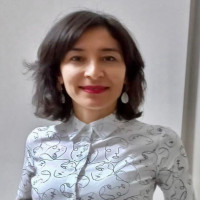
https://avesis.anadolu.edu.tr/emelgoksal
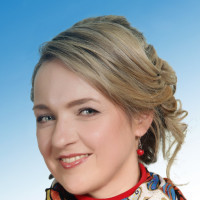
Dzintra Iliško is a Daugavpils University, Center of Sustainable Education, Latvia professor. She has Ph.D. at Fordham University, Graduate School of Religion and Religious Education, USA. Since 2019 she is an editorial member of IEJES International e-Journal of Educational Studies. E-ISSN: 2602-4241; Since 2010 A Member of the International Editorial Board of the JOURNAL OF TEACHER EDUCATION FOR SUSTAINABILITY, SCOPUS, and Since 2010 a member of the International Editorial Board and co-editor of DISCOURSE AND COMMUNICATION FOR SUSTAINABLE EDUCATION, ERIH + Since 2005 BBCC – Baltic & Black sea Circle Consortium in educational research) member
Since 2004, ISREV - International Seminar on Religious Education and Values (ISREV) (full time member)Since 2004 ESWTR- European Society of Women in Theological Research, member
ORCID ID: https://orcid.org/0000-0002-2677-6005
Web of Science Researcher ID O-3090-2019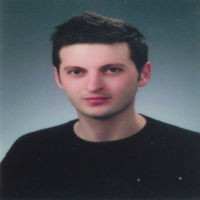
Dr. Sercan BURSA is an associate professor at Anadolu University, Faculty of Education, Department of Turkish and Social Sciences Education. His main research interests include social justice, values education, environmental justice, and blended learning in social studies education.
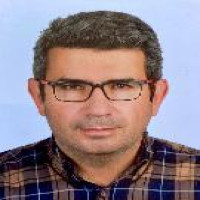

Şule Demirel Dingeç, who works in the Department of Education for the Gifted at Anadolu University's Faculty of Education, completed her master's and doctoral degrees in the field of gifted education. She has also earned her associate professorship in the same field. Her research focuses on the identification of gifted students, educational differentiation, character development, values education, the sociocultural dimensions of giftedness, and the families of gifted individuals.
Editorial Board
Dr. Magdalini Vampa,
Associate Professor, by decree no. 16.11.2022 of the Commission for the Promotion of Academic Personnel, University of Tirana.
“Education is not the learning of facts but training the mind to think”, this Einstein quote is the motto of my everyday work.
As Head of Department of Social Sciences at the Faculty of Natural and Human Sciences “Fan S. Noli” University of Korça, I successfully designed three new study programs in the field of policies and social services and in leadership and ethic; for five years have led the development of six study programs in the bachelor and master. I have taught, coordinated and developed a number of bachelor's and master's courses within the department: “Research methods in education”, “Leadership in education”, etc. I am currently a trainer to the school of leadership (CSL Albania) Vision module.
My research field of studies "Leadership in education" started with doctoral studies in 2010 aiming to present a panorama of the leadership model in Albanian education after the 90s and the need for transformation, which has continued with studies and their presentations in scientific activities in national and international level.

Sergii Boltivets – Doctor of Psychological Sciences, Professor, Chief Researcher of the State Institute of Family and Youth Policy of Ukraine, Head of Rehabilitation Programs of the Clinic of Active Therapy of Special Conditions in Kyiv, Chairman of the Kyiv Psychiatric and Psychological Society, Ukrainian Society of Hypnosis. Chairman of the All-Ukrainian Coordination Bureau of the Program “Adult Education of Ukraine”, which operates with the assistance of the UNESCO International Institute for Lifelong Learning (2000), Member of the European Association for Security (2003). Provides psychological support for the rehabilitation process of the Kyiv Center for Comprehensive Rehabilitation of Persons with Chronic Mental Disorders, psychological prevention, psychological diagnostics and psychological assistance based on the developed and published over 600 scientific papers on fundamental problems of mental hygiene and clinical psychology, age psychology, pedagogical psychology, history of psychology, andragogy, psychohygiene of teaching and upbringing, social psychohygiene, hypnotherapy. Deputy editor-in-chief of the psychological journals "Psychology and Society" (Ukraine), "Problems of Psychology in 21 st Century" (Lithuania). Author of psychological devices and devices "Khyst", "Pyatra", "Rin", "Duzhin".
Research interests:
Clinical psychology; Psychological rehabilitation; Psychohygiene; Psychological equipment; Clinical hypnosis; Mental health criteria.
Chung-Ying Lin, Ph.D., Professor at the Institute of Allied Health Sciences, Department of Occupational Therapy, Department of Public Health and Biostatistics Consulting Center, National Cheng Kung University Hospital, College of Medicine, National Cheng Kung University, Tainan, Taiwan. His research interests include mental health, quality of life, health behaviors, stigma, addiction, and psychometric testing.
Prof. Adesoji Oni, an eminent figure in the field of education, holds the distinguished position of Associate Professor in the Department of Educational Foundations at the University of Lagos, Nigeria. His expertise lies in the intricate field of Sociology of Education, where he imparts knowledge spanning from undergraduate to postgraduate levels, including Philosophy of Education and Comparative Education.
In the illustrious year of 2022, Prof Oni achieved a pinnacle in his career by receiving the prestigious Shining Star Achievement in Research Award from the Noam Chomsky Global Connections Award. Bestowed by The Society of Transnational Academic Researchers (Star Scholar Network), this award is a celebration of scholarly excellence that transcends disciplines and languages, underscoring Prof Oni's exemplary publications in scholarly journals, books, and collaborative scholarly endeavors.
On the 26th of December 2020, Prof. Oni's brilliance was further recognized as he was inducted into the International Educators Hall of Fame, USA, receiving the Distinguished Inductee recognition from the United States Congress (House of Representatives) on December 27, 2020.
Prof. Oni's academic journey has taken him to esteemed institutions worldwide, including a tenure as a Rooney International Visiting Scholar at Robert Morris University, Pennsylvania, USA, from 2018 to 2019. In earlier years, from 2003 to 2004, he served as a Fulbright Visiting Scholar at Southern Illinois University Carbondale, USA, showcasing his commitment to fostering international academic exchange. Contributing to global collaboration, he participated as a Visiting Scholar in the African-Korean Education Collaborative Exchange Programme at Pusan National University, South Korea, in January 2015.
Among his accolades is the title of Most Accomplished African Educational Researcher in 2014, a prestigious award from the Association for the Development of Education in Africa (ADEA)/African Development Institute (ADI)/Korea Trust Fund.
Prof. Oni's dedication extends beyond the academic realm. He served as a Consultant to the Nigeria Governors’ Forum on Education Expenditure and Institutional Review and remains a regular consultant to the Universal Basic Education Commission (UBEC) in Abuja. His consultancy also reached international levels, acting as a consultant to UNESCO Africa and contributing as an External Evaluator of the Japan-UNESCO Project on Empowerment of Women and Girls in Marginalized Communities for Better Well-Being through Education and Advocacy in Bauchi, Delta, and Gombe States, Nigeria (April-May 2022). Additionally, he was a consultant to UNESCO Africa Abuja project on the development of a fundable proposal on Out-Of-School-Children in Nigeria. Prof. Oni proudly serves as the Education Lead Expert to NATCOM UNESCO, Nigeria, and also a regular consultant to UNICEF, Nigeria Port Authority,
His awards and recognitions include the 2006 Winner of the Fafunwa Educational Foundation Award for the Best Ph.D. Thesis in Nigerian Universities Faculties of Education and the recipient of the 2008 $10,000 Text Book Writing grant for a Textbook titled "Teacher Education Systems in Africa in the Digital Era," sponsored by the Council for the Development of Social Science in Africa (CODESRIA) in Senegal. He was awarded the Most Principled Lecturer in the Faculty of Education, University of Lagos, by the Nigeria University Education Students Association (NUESA), UNILAG Chapter in 2011. Additionally, he received the Award of Excellence as Outstanding Educator in Nigeria in 2013 from the Nigerian Education Times.
In 2015, Prof. Oni was granted a $5,000 research grant by African Minds South Africa to conduct a study titled "The Effectiveness of Students’ Involvement in Decision-making and University Leadership: A Comparative Analysis of 12 Universities in South-West Nigeria."
Delving into the heart of his research, Dr. Oni focuses on critical areas such as social problems in education, social change, teacher education, and the study of social deviances and disorganizations in education, particularly addressing students' secret cults in Nigeria. His impactful work comprises 171 publications, including chapters in books and articles published in national and international learned journals.
His international academic papers grace the pages of reputable journals worldwide, showcasing his influence from the USA, India, and South Africa to Uganda, Ghana, Malaysia, UNESCO (France), Japan, Botswana, Switzerland, Cote d'Ivoire, the Philippines, Bulgaria, Turkey, the Netherlands, Senegal, South Korea, Poland, Spain, Tanzania, Canada, Italy, Zambia, Nepal, Kosovo, Kuwait, the United Arab Emirates, Albania , Canada, Zimbabwe, Mali Romania and beyond.
As a testament to his commitment to advancing scholarly discourse, Dr. Oni serves as the editor of approximately 10 academic journals, both in Nigeria and overseas, further solidifying his role as a catalyst for intellectual growth and global collaboration. He is a prominent figure in African Asian Dialogue on Education Network at Hiroshima University, Japan. He is currently the Head of Department of Educational Foundations, Faculty of Education, University of Lagos, Nigeria.
Prof Oni has served and still serving as external examiner to universities like: University of Ilorin, University of Jos, University of Port Harcourt, University of Benin, University of Cape Coast, Ghana, University for development Studies, Ghana, University of With waterstarnd South Africa, University of Fort Hare, South Africa, University of Zimbabwe, Makerere University Uganda, where he has served as PhD examiner and Promotion assessor.
Oni's extensive travels have taken him to countries across all seven continents of the world. Beyond his academic pursuits, he finds joy in a happy marriage and is blessed with three loving children.
Assistant professor of the Faculty of Education, member of the Department of Education and Innovation. Member of the faculty of the Master in School Management and Religious Sciences: leadership and pastoral management of the Catholic University of Temuco. Reviewer of scientific journals (Perspectivas Educacionales de la UCV; Sophia Austral de la UMAG; Revista Atenea de la UDEC), collaborator as evaluator of Conicyt and OEI.
Trained in educational research, curriculum and evaluation and educational innovation, management of educational organizations and project management in higher education. He has focused his research on issues of innovation, educational change; vulnerability and inclusive access; professional technical vocational training; motivation and learning.
He participates in a number of networks at international and national level collaborating member of the CIFO group of the UAB and the TRALS group of the UB; Member of the Interuniversity Network of Researchers in Education (IE). Co-investigator R&D project entitled “Transitions and trajectories of doctoral students. Analysis of the stages of the training cycle and its relationship with intervening factors (TREDOC)” PID2023-147669OB-100 of the University of Barcelona. Researcher responsible FONDECYT Project 11240073 (2024-2026), "Motivational factors of the change of approach in the evaluation of learning in Initial Teacher Education, expectancy and value.” Co-investigator Internal project Sello UCT (2024-2025) Conceptions of interculturality in Mapuche context underlying institutional documents and practices. Co-investigator FONDECYT regular 1210626 ( 2022-2025) “Motivation oriented to learning in university students in the areas of education and health. Co-investigator FONDECYT regular 1181159 ( 2018- 2022) “Help-seeking and participation in institutional academic support services (AAI) at the university level: understanding the process from the students' point of view.” Co-investigator FONDECYT Project No. 1151233 ( 2017-2018) “School history in interethnic and intercultural contexts: a study from the school system in Mapuche/non-Mapuche context”. 2015-2018. Co-investigator FONDEF IT14I10099 KIMGENLAB (2015-2017)Laboratory of natural risks in Chile. Co-investigator FONDEF Project -idea- IT14I10099 2015-2017. Kimgen Lab. FONDEF -IDEA. Principal Investigator DIUCT-DGIP Project 2015-2016 “Development of multimedia simulator for the strengthening of deep learning through the study of drip irrigation system in the technical-agricultural specialty”. 2015-2017. Co-investigator FONDEF Project TE-1211015 (2012-2015) KimGen Red: Learning local and global geography, and its natural risks, using multiplatform mobile collaborative systems”. UCTemuco. Adjunct researcher Observatory for Socio-educational Inclusion Universidad Autónoma de Barcelona N° 193 Project I+D 2010 EDU 2010-2015. Co-investigator FONDEF TIC-EDU Project TE101003 (2010-2013) “Natural hazards: a didactic-digital approach for teaching-learning, through the integration of geomatics, digital simulation and collaborative environments”. Catholic University of Temuco,Researcher National R+D+I Plan ( ref. SEC2003-08366). Delimitation and experimentation of a networked knowledge management model”. 2004-2006. Adjunct Researcher of the Educational Management Team of the Universidad Autónoma de Barcelona (EDO) in project “development of a knowledge management model through virtual networks for History teachers” Directed by Dr. Joaquín Gairín Sallán. DIUCT-DGIP project researcher. 2013-2014. The challenges for the installation of a Quality School Management: A look from the region of La Araucanía, awarded in the framework of a Performance Agreement for the increase of publications. DIUCT projectresearcher . 2012-2013.
Construction and validation of a test of pedagogical knowledge for the progressive evaluation of the learning of future Basic Education teachers.
Dr. Jian-Hong Ye is currently a lecturer in the Faculty of Education at Beijing Normal University, a distinguished expert at the National Institute of Vocational Education at Beijing Normal University, and a visiting professor at Ningxia Polytechnic. He graduated from the Department of Industrial Education at National Taiwan Normal University, where he also served as a postdoctoral researcher. Dr. Ye is an honorary member of the Phi Tau Phi Scholastic Honor Society (Taiwan) and an outstanding alumnus of the Department of Fashion Design at Tainan University of Technology. In recent years, Dr. Ye has served as an associate editor for a section of Heliyon, and he has also worked as a guest editor and peer reviewer for several SSCI, SCI, and Scopus journals. He enjoys conducting empirical research from a psychological perspective. His research interests include the digitalization of vocational education, curriculum and teaching innovation, student psychological health and well-being, and interdisciplinary topics.
Mpho-Entle Puleng Modise, PhD. is an Associate Professor in the Department of Curriculum and Instructional Studies, College of Education at the University of South Africa. Her research areas include faculty and student support in higher education and distance education, open distance e-learning, academic and professional development, technology adoption, and the use of ePortfolios in teaching and learning. Prof. Modise is a member of the SAERA executive committee, advocating for Early Career Researchers in South Africa and Africa. Her commitment to research excellence has earned her several prestigious awards, including recognition for her PhD thesis from EASA and SAERA in 2022, the Women in Research Emerging Researcher Award in 2023, and the External Recognition for Research Excellence award at UNISA in 2024.
Section Editors
Alan Editörü-Güzel Sanatlar Eğitimi
Alan Editörü- Matematik Eğitimi

Alan Editörü-İngiliz Dili

Alan Editörü-Özel Eğitim
Field Editor- Educational Administration and Management

Lisans: Erciyes Üniversitesi Eğitim Bilimleri Enstitüsü Türkçe Öğretmenliği
Yüksek Lisans: Erciyes Üniversitesi Eğitim Bilimleri Enstitüsü Türkçe ve Sosyal Bilimler Eğitimi Bölümü
Doktora: Erciyes Üniversitesi Eğitim Bilimleri Enstitüsü Türkçe ve Sosyal Bilimler Eğitimi Bölümü
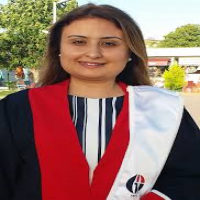

Alan Editörü-Rehberlik ve Psikolojik Danışma
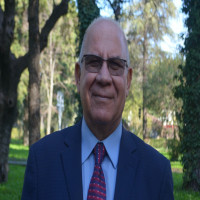
Alan Editörü-Sınıf Eğitimi
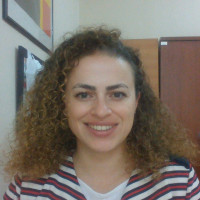

Alan Editörü- Ölçme ve Değerlendirme
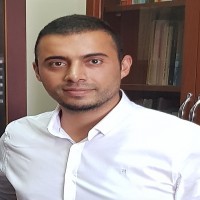
Language Editors
https://avesis.anadolu.edu.tr/ilknurcivan

Dil Editörü-İngilizce Dil Editörü


Öğr. Gör. Dr. Halil DÜZENLİ, Anadolu Üniversitesi (İngilizce Dil Editörü)
Advisory Board
Dr Olivia Kunguma holds great interest in science communication because she believes it is futile to develop the best scientific knowledge and not share it with the public or non-experts. She also thinks research should be grounded in policy or challenge policy to foster sustainable societal change. In addition to this view, any research not grounded in policy or challenging policy is fruitless because for change to come to fruition, policy must be developed and implemented. These two are Dr Kunguma's school of thought, and her views are observed in her peer-reviewed publications and opinion pieces.
Dr Kunguma holds a BA and Honors degree in Integrated Marketing Communication, a Master's Degree in Disaster Management, and a PhD in Disaster Management. Her work has focused on disaster information management and communication systems in provincial disaster management centres and reviewing and improving disaster governance. Her PhD focussed on challenging the South African Disaster Management legislation. It is perceived as one of the best in the world but has encountered challenges with implementation.
She is a lecturer at the University of the Free State – Disaster Management Training and Education Centre for Africa (UFS-DiMTEC), teaching Management of Media Relations and Strategic Communication, Strategic Disaster Management, and Legal and Institutional Arrangement in Disaster Management.
In her academic career, she has graduated more than 400 postgraduate diploma students in disaster management, supervised and graduated more than 20 Masters of Disaster Management research students, and one PhD candidate whose work was on establishing effective Flood Early Warning Systems as guided by the Namibian Disaster Risk Management Act. She has presented her research at local and international conferences like the World Conference on Disaster Management in Toronto, Canada. Dr Kunguma is a registered professional member of the Disaster Management Institute of Southern Africa (PrDM08) and the South African Communications Association (SACOMM).
Her research interests include analysing disaster management legislation and policies and their implementation, Strategic Disaster Management, Disaster/Risk Communication, and institutional arrangements in disaster management.
Dr Kunguma has worked on several research projects as part of her contribution to engaged scholarship, such as developing the Integrated National Drought Management Plan for South Africa, where she led the development of the Drought Information Management and Communication Plan; Review of the eThekwini Disaster Management Plan project; Developing a crisis communication plan for Frances Baard District Municipality; Development of National Drought Information Management and Communication Systems; Review of the Disaster Management System in South Africa; Efficiency and gap analysis of the South African National Disaster Management Framework of 2005; Review of the disaster management institutional arrangements and coordination modalities for COVID-19 response and several other projects.
Disaster management is a new and fast-evolving profession. Some countries, such as South Africa, Lesotho, and Namibia have made great strides with the change from Civil Protection to Disaster Management or Disaster Risk Management. With the challenges encountered in moving from civil protection to implementing disaster management policies, Dr. Kunguma intends to make significant contributions to improving disaster management policy and its implementation in South Africa and Africa.
Meral GÜVEN, Anadolu Üniversitesi, Türkiye
Editorial Secretariat
Anadolu University Journal of Education Faculty (AUJEF)
Phone: +902223350580-3550 E-mail: aujef@anadolu.edu.tr
Website: https://aujef.anadolu.edu.tr/

This work is licensed under a "Creative Commons Attribution-NonCommercial-ShareAlike 4.0 International License" from 2020.

